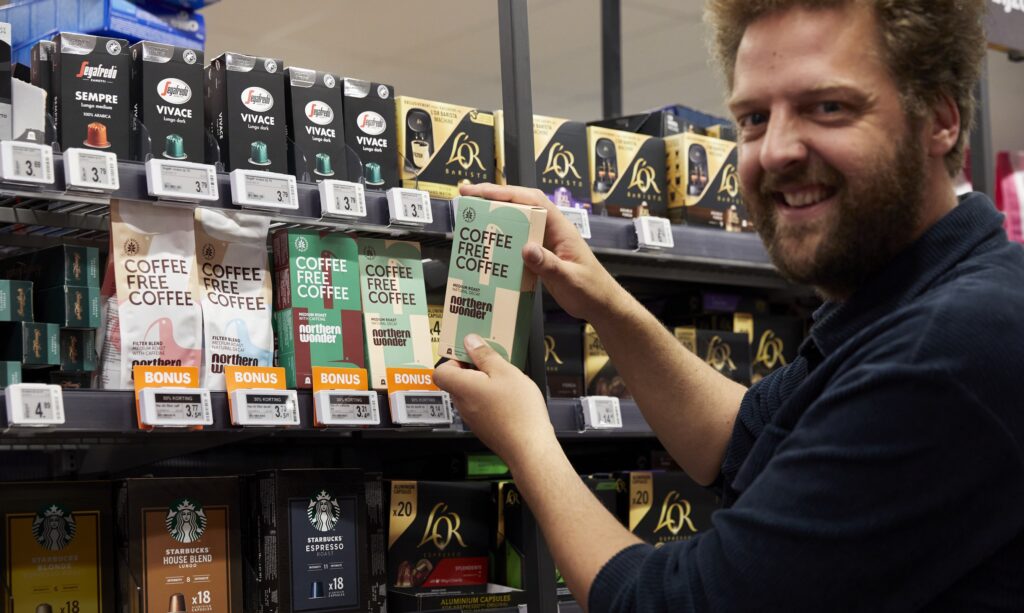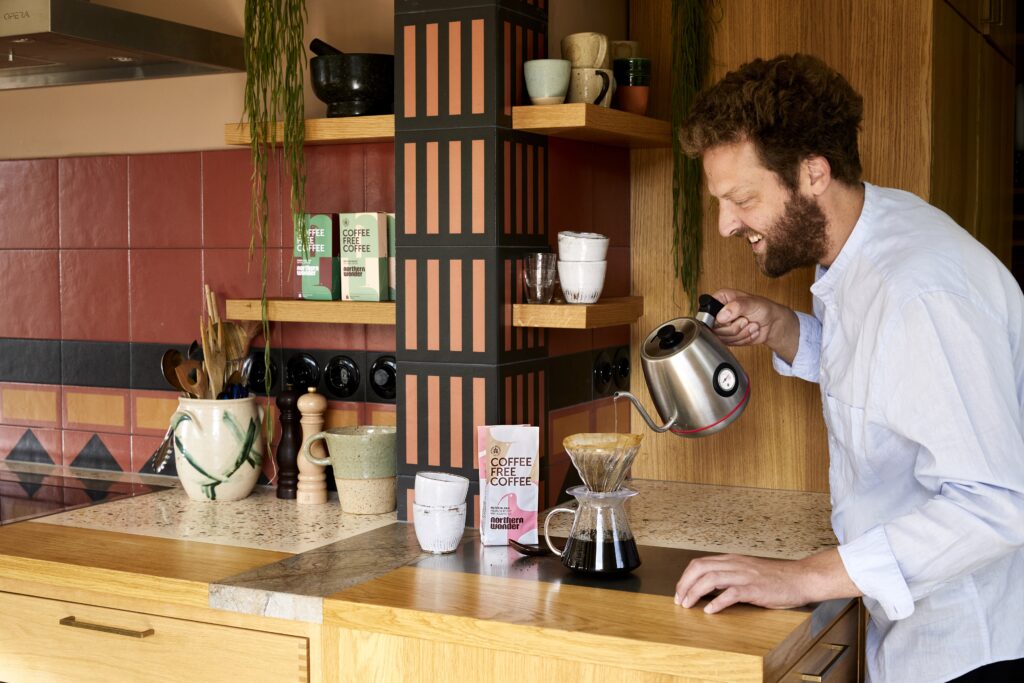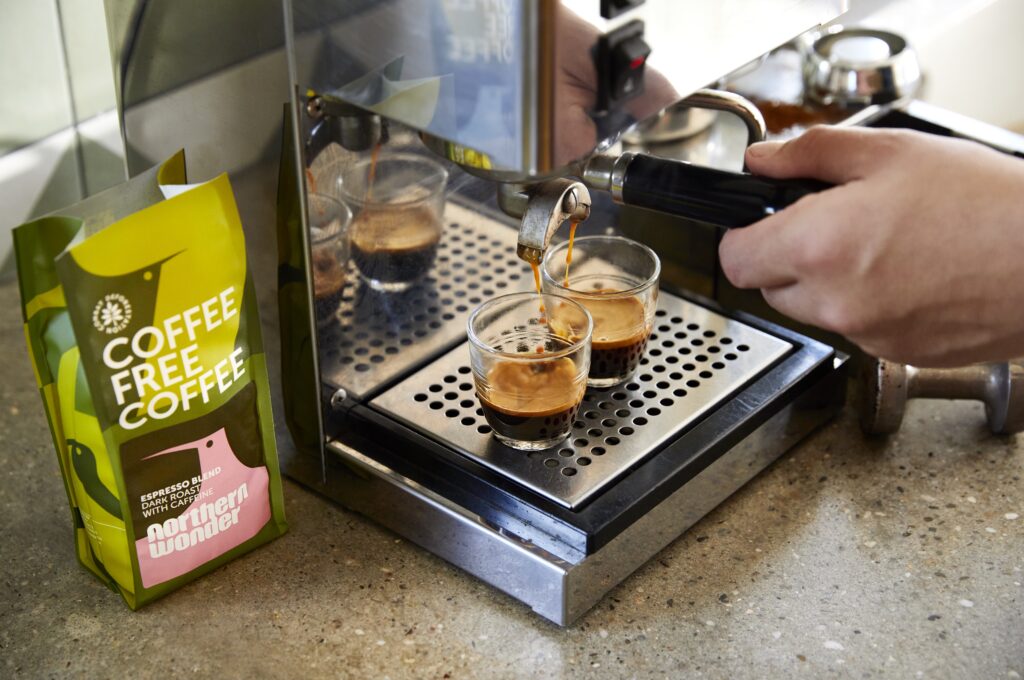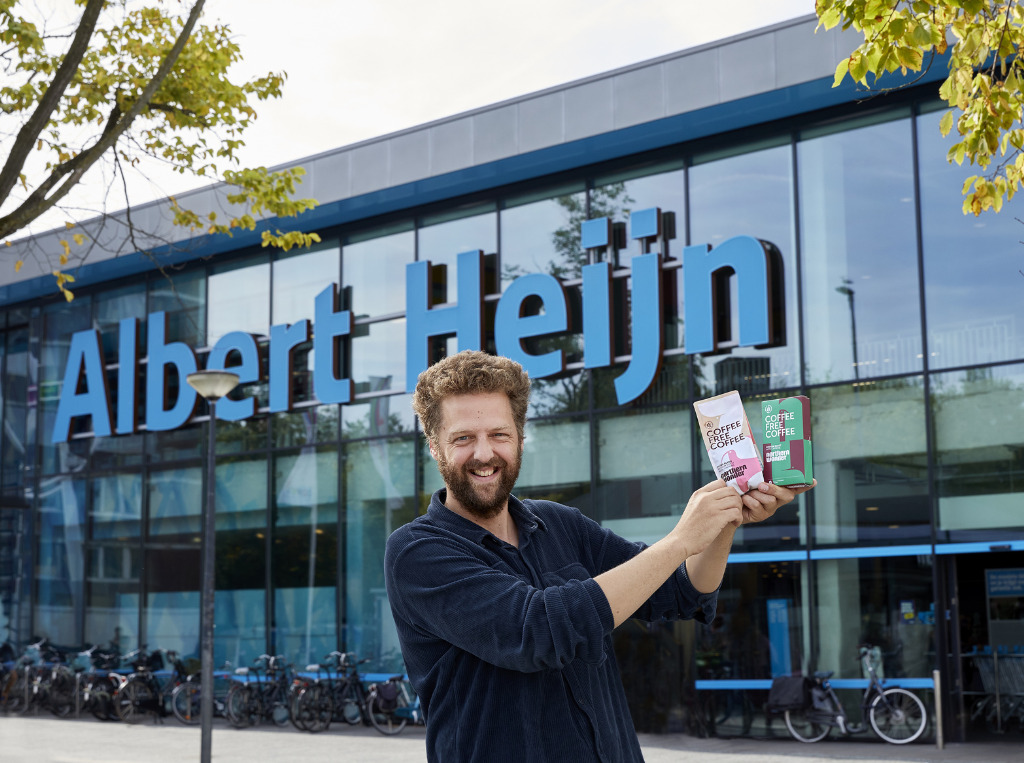Northern Wonder’s Coffee-Free Coffee Makes Dutch Retail Debut with Filter Grounds and Pods
5 Mins Read
Dutch food tech brand Northern Wonder has made its retail debut with four beanless coffee products at supermarket chain Albert Heijn in the Netherlands. The Coffee-Free Coffee pods and filter grounds are the second iteration of the startup’s original lineup, which now also includes online-exclusive espresso-style grounds.
Founded in 2021 by David Klingen, Bas Franse, Andreas Giel and Onno Franse, Northern Wonder uses a combination of non-tropical ingredients to make what it calls a “deforestation-free” coffee alternative. While its products have been available online for a year now, the Albert Heijn listing coincides with a move from an R&D phase to mass-market penetration (it plans to stock its coffees in another leading European retailer soon), and a revised formulation with an enhanced flavour profile.
“Our second release shows strong improvements in strength and body and is much more coffee-like,” Klingen, who is Nothern Wonder’s CEO, tells Green Queen. “We succeeded in this by changing some pre-roasting processing steps for one ingredient, and we made changes in the roasting profiles of various ingredients. And some small changes were made on ingredient use.”
Non-coffee ingredients

The filter blend comprises lupin beans, barley, rye, chickpeas, chicory and blackcurrant while the capsules contain lupin, barley, rye, fig, chickpea, chicory, carob and blackcurrant. The products are available in caffeinated and decaf blends (the decaf filter grounds also feature dandelion root). And the pods are made from plant-based composites, eschewing the need for aluminium or plastic and making them home-compostable.
Northern Wonder uses a synthetic caffeine source, which is molecularly identical to naturally-derived caffeine. It opted for the former because all the natural sources come from tropical plants, like coffee, cocoa and tea. “Of course, this was and still is a dilemma for us, since we prefer to have a natural source of caffeine. However, we [have] set ourselves a target to not use tropical ingredients and the use of synthetic caffeine fits best for now.” says Klingen. “We use the same source of caffeine as the majority of caffeinated beverage (like cola and energy drinks) manufacturers are using.”
Klingen says almost all manufacturing steps for the beanless coffee are outsourced to partners: “We do one step (related to particle size optimisation) in-house, as this requires equipment specifically built for creating our Coffee Free Coffee products.”
The new SKUs, priced between €4.49 and €5.29 for 250g of grounds or 10 capsules, are cost-competitive with many private-label coffees and those from big chains like Starbucks, and cheaper than most specialty coffee.
Speaking of which, Northern Wonder conducted a coffee tasting with Q graders, licensed professionals who evaluate coffees based on specialty coffee standards. “We were very positively surprised with the score. Our second release was rated much higher compared to the first release. And in particular, our espresso blend is scoring great,” notes Klingen. “On the basis of this great feedback, we’re now starting with more commercial activities in the world of (specialty) coffee shops with a green/sustainability focus.”
Complementing, not replacing, coffee and farmers

Climate change has affected coffee production and prices and threatened the existence of several species of the crop. Increasing global heating and demand have forced plantations to relocate, which has driven tropical deforestation. Coffee is also amongst the highest-emitting foods, topping the list of greenhouse gas emissions per 1,000 kilocalories, at 50.95kg of carbon dioxide equivalent.
Beanless coffees like Northern Wonder’s tackle many of these issues. The Dutch startup conducted a Life Cycle Assessment this year to measure the impact of its products and found that they require 95% less water per cup, use 66% less land, and emit 76% less carbon during production than conventional coffee.
As we reach Peak Coffee, meeting consumer demand on the back of ecological challenges is tougher than ever before. Are alt-coffee brands meant to replace the conventional crop, or merely provide an option to ease the burden? “We see ourselves indeed as complementary. There will always be conventional coffee,” says Klingen, adding: “We do not oppose coffee like, for example, Oatly opposes dairy. We only see coffee being an upcoming driver of deforestation because of increased demand and indeed climate change.”
Along the same lines, Northern Wonder also addresses concerns on its website about the livelihoods of coffee farmers over a switch to beanless coffee: “There is such good demand for coffee that existing coffee growers will be able to continue their work. We only try to combat deforestation by limiting (a bit) the need of further expansion of land used for coffee growing. Less demand for coffee limits the role coffee will play as a driver of deforestation.”
New products in the pipeline, including whole beans

The brand has been teasing its espresso-style dark roast grounds for a while, and they’re finally available on its website, which also mentions a cold brew under development. “A ready-to-drink (RTD) product is on our product development agenda,” confirms Klingen. “But as the market for RTD products is not so big in the EU, our focus lays at ground coffees.”
Northern Wonder has also been working on creating whole beans – the holy grail of alt-coffee, if you will – and is preparing to produce them at scale soon. “Our whole bean is so promising from both a commercial and technological point of view,” says Klingen. “On the one hand, it makes it possible to serve coffee-free coffee using existing whole-bean coffee machines. And, as importantly, pressed beans make it possible to lock in volatile coffee-like aromas so they are at full quality at the moment of grinding and brewing, just like what happens with traditional coffee.”
As the company plans its second investment round (it has raised €1M in previous funding), this is what investors are showing heaps of interest in. “We see that this patentable technology will eventually lead to a product with a lower price than coffee.”




